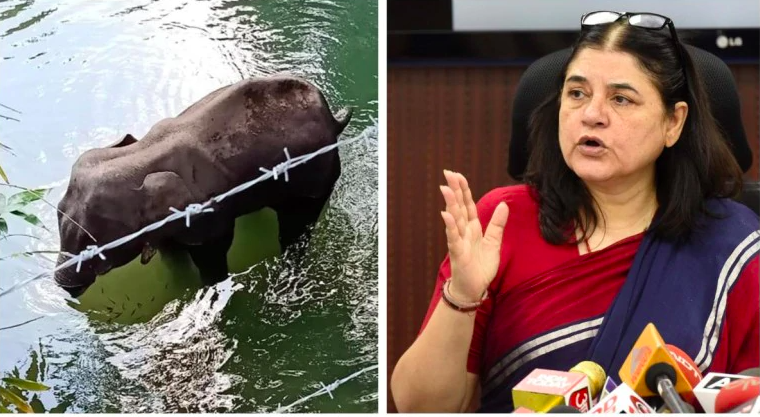OPINION: Hate against Malappuram—Politics over India’s Elephant incident
by Mustafa Thalthodi
When India got under fire after the demolition of Babri Masjid, Malappuram remained peaceful. Muslim youth were protecting temples from thoughtless mob.
Mrs. Menaka Sanjay Gandhi, well known to the Indian polity, was destined to gain limelight the day she flocked her hands with Sanjay Gandhi in her teenage. At the age eighteen she came to the Raisina Hill – the PM’s office where Smt. Indira Gandhi was holding the office.
After the death of Sanjay Gandhi in 1980, she was ousted from PM’s house due to disagreements with her mother-in-law. Soon Menaka started a society, and after the death of Smt. Indira in 1984, Rajiv Gandhi became the prime minister and Menaka stood as the opponent.
After a short while she became star among Janatha Dal leadership under V.P. Singh. But, that didn’t last long. Chandrashekhar’s Dal was her next jump, then to Dev Gauda and finally she took triple-talaq from Dal family and joined BJP.
BJP was happy to get a Gandhi and her son Varun. New asylum was next-to-best for both. In 2014-19, Menaka was cabinet minister. But in 2019, she was unlucky to draw attention of BJP’s new managers. Holing the hedge, both Gandhis have fair skill to survive in troubled waters.
In 2019’s election campaign she warned Muslim voters that if they were not casting vote in favour of BJP, Muslims should not approach her for any matter. Varun in 2009, dared to vocal furiously to a large crowd with an anti-Muslim hate speech. He said any Muslim who will harm a Hindu, should be chopped-off his hands. Both mother and son well managed to keep Sultanpur and Pilibhith seats in every election. Islamophobia is the tool for their victory.
What is new? Last week of May, a female wild elephant died after consuming an explosive-packed pineapple in Kerala. The explosive was supposedly kept for wild-pigs, which used to come to agrarian area and destroy the crops.
Kerala is a narrow strip between Arabian Sea and the Western Ghat Hills. So, there will be hardly any way to protect the farms from wild animals. This has been reality for ages. Governments, officials, forest department and every layman understand this fact.
The death of an elephant opened opportunity to Menaka, where she utter Nagpur language against a community. Thousands of Whatsapp groups and fake-Twitter handles managed by Sangh Parivar immediately spread the scoop nationwide. The message was that, Hinduism’s sacred animal killed by Muslims in a district that is the most notorious in India.
There are 14 districts in Kerala. Elephant incident happened in Palakkad district. The adjacent district is Malappuram, where Muslims are in majority. A false news sprung that the elephant died in this Muslim district. Menaka immediately tweeted and had given an interview to ANI news-agency.
Instead of discussing the elephant’s death, she accused Malappuram as the most notorious district in India. The people are heartless. They chop people’s hands for ideological differences. They produce bombs in houses. They throw poison in the roads to kill birds and dogs. Women are being treated cruelly. Everyday something mischievous happens here. They are very dangerous people and the state government is afraid to take legal actions against these people of Malappuram. She went on and on with her malicious attacks.
Sanghi social media platforms further added fuel to it.
Immediately after her intervention, millions of re-tweets spread in north India. All repeated the same. Malappuram is mini-Pakistan. This hate was not newly invented. Malappuram district was created in 1969.
When India became sovereign country in 1951, there were only 308 districts and Kerala was born in 1956, there were only five districts. Now, in India there are 739 districts of which 14 are in Kerala.
But in case of Malappuram, the BJP’s predecessor, Jana Sangh started hatred slogans against the new district in 1969. Eminent leaders came to Kerala to lead agitation campaign. Jana Sangh President Bach Raj Vyas, Treasurer Nanaji Deshmugh, Madan Lal Khurana are some of them. National newspapers like The Statesman, Free Press supported them.
Organizer weekly of RSS in 1980s published an exclusive cover story on Malappuram named ‘Mini Pakistan’. The illustration was so boisterous with pictures on accounts of Malappuram’s Islamic fundamentals. It said that the Hindu community in this district living under utter fear. They are being either forcefully converted or oppressed. Outnumbered Mosques resembles Saudi Arabia.
The Islamophobia was detailed and vivid. It remains same today. Kerala’s BJP newspaper Janmabhoomi rationalized Menaka, and even published an article saying that the creation of this Malappuram was another “partition”.
Now the district is 51-years-old. There has been not a single case of communal violence so far. It has the lowest crime rate in Kerala and in India. It is the fast growing city in the world. It is the first district that announced IT mission accomplished in India. Muslim population is 71%, while Hindu and Christian population is 27% and 2% respectively.
When India got under fire after the demolition of Babri Masjid, Malappuram remained peaceful. Muslim youth were protecting temples from thoughtless mob. There is no bomb culture in here, no lynching, no witch hunting. Once up on a time the rural areas of this district were the backward in Kerala. Now it has more roads and educational institutions than any other Kerala districts. The social fabric of Malappuram is rich. There are more than 150 old-age homes in Kerala, but none of them are listed from Malappuram.
Malappuram remains in absolute fraternity. There are famous 30 temples and 30 mosques, where people used to visit from far places. This is the most populated districts in Kerala with five million people. The suicide rate is the lowest.
Mrs. Menaka accused this is the place that the atrocities against women are most, but the reality is just opposite. This might be one of the best districts in India where women are treated fairly.
It’s highly impossible to rate criminal statistics comparing Malappuram district and Sultanpur where Mrs. Gandhi elected. For instance, Sultanpur reported 292 kidnapping cases whereas Malappuram has had only 24. Women atrocities in Sultanpur reported 22 and Malappuram has merely two. The list can go on.
It’s an open invitation from Malappuram to all those who blindly believed Mrs. Gandhi’s hate-speeches, to come and stay here for at least a week, to feel the difference of chalk and cheese.
Mustafa Thalthodi is an academician and social worker from south-Indian state of Kerala.
Featured Image credits: IndiaToday.



